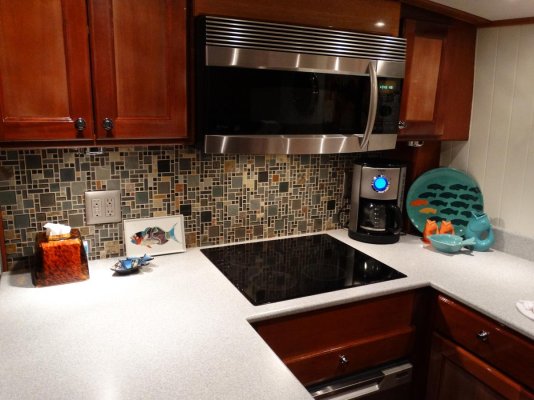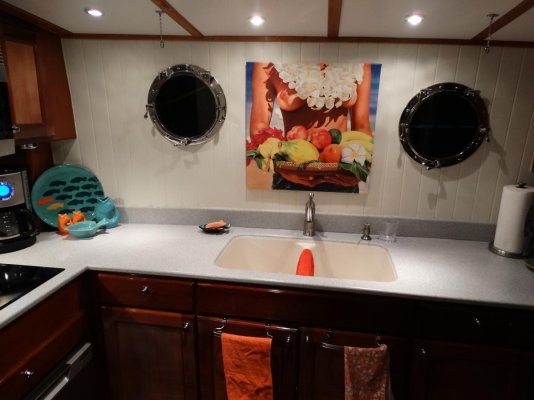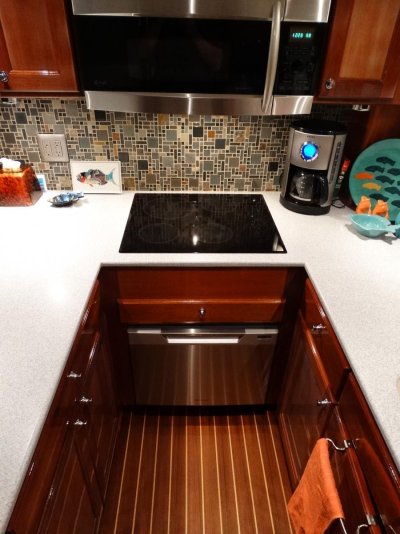I think that the most important consideration when deciding whether to live aboard full time or not is the selection of the right boat. Things that are small annoyances for weekend boating or short duration cruises, can become a constant thorn in the side on a day to day basis. Perhaps the best example of this is the size of the refrigerator. Most boats under 50' will typically have a refrigerator that is no bigger than 12-13 cubic feet with a very small freezer section. They may have a secondary freezer or drink chiller located elsewhere, but the overall effect is more like camping out where you are making do because you are living on a boat. Having less food storage capacity impacts meal planning, results in more trips to the grocery store and the associated cart trips from the car to you slip. It is probably a combination of factors like this that ends the live aboard experience for most couples.
Another consideration is storage. Are there enough lockers, drawers and cabinets to put the "stuff" of everyday life away. I always chuckle over the ads for new boats with the beautiful uncluttered interiors and the obligatory bottle of wine with two glasses waiting on the table next to a vase of flowers. Just because you are living on a boat does not mean that you get rid of everything from your past life on shore. We still have suitcases, a set of golf clubs, a small Christmas tree and other holiday decorations, wrapping paper, stamps, greeting cards and stationary, printer ink and paper, books, photos, personal papers and documents, etc. Add to that the things that are boat specific like charts, guide books, hand held radios, survival gear and life jackets, dock lines, power cords and adapters, boat hooks, binoculars, etc and you have quite a lot of "stuff" that has to be dealt with. Full Disclosure: We have a 5' x 10' storage locker in MN for the rest of our personal "stuff" that is not onboard.
My wife and I have been living full time on Semper Fi for almost four and half years and during that time we have cruised over 6000 miles, so I feel somewhat qualified to express an opinion on this thread. For us, the right boat was only 37 feet in length, but it packs a lot of punch in that 37 feet. Starting with the galley, which is really much more like a kitchen you would find in a condo. The overall dimensions are roughly 10' x 7' and in that space we have a GE double door 23 cubic foot refrigerator with ice and water in the door, a Fisher Paykel dishwasher, a standard sized double bowl sink, a convection/microwave combo oven and enough cabinets to store everything my wife needs to prepare and serve delicious full course meals. When fellow boaters or landlubbers step aboard Semper Fi for the first time, they are always amazed at the layout and the size of our galley.
As to storage, we have the space of a much larger boat. In the forward stateroom alone, there are two 40" hanging lockers, 10 drawers and six additional cabinets. The second stateroom has six drawers and a book shelf. In the lower level there are under deck lockers on the port and starboard sides. Cleaning and laundry supplies, extra foodstuffs and the wine cellar are located in these lockers. There is also a bosun's locker or "basement" that runs the full width of the boat aft of the engine room. It is accessed by a hatch under the salon level. The salon itself has under seat storage and six more drawers. I suppose it is possible to run out of places on Semper Fi to put our "stuff", but should that happen, it would be a warning that we have way to much junk onboard. The exterior of the boat includes voluminous under seat storage on the fly bridge and two lockers on the fore deck.
All of the features described above impart a much more home like feel to our chosen lifestyle. The fly bridge gives us a great area for entertaining, much like a home patio, or a quiet space to disappear to if needed. The head is large and user friendly with adequate storage. We have a Splendide washer dryer combo which gives us flexibility for dealing with laundry and the 100 plus gallon holding tank allows us to go weeks before pumping out if necessary. These are important issues when you are comparing camping out on a boat versus living aboard with home like amenities.
The icing on the cake is our walk in engine room, which provides easy access to all things boat system related. It is much easier to trouble shoot a Vacu-flush pump or fresh water pump if you can duck inside the engine room door to take a peak instead of pulling up the floorboards to go down into the dungeon. This also adds to a more home like experience. I fully understand that there are many factors that go into purchasing a boat, including price, availability and boat location to name just a few, but a workable galley and abundant storage would be high on my list of priorities if I was looking for a liveaboard boat.





